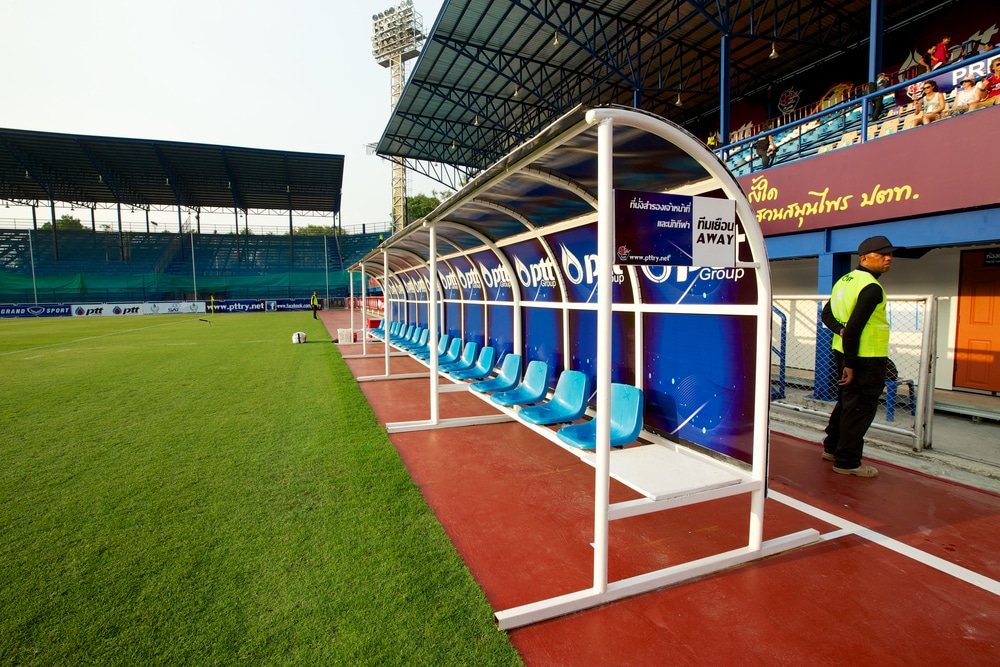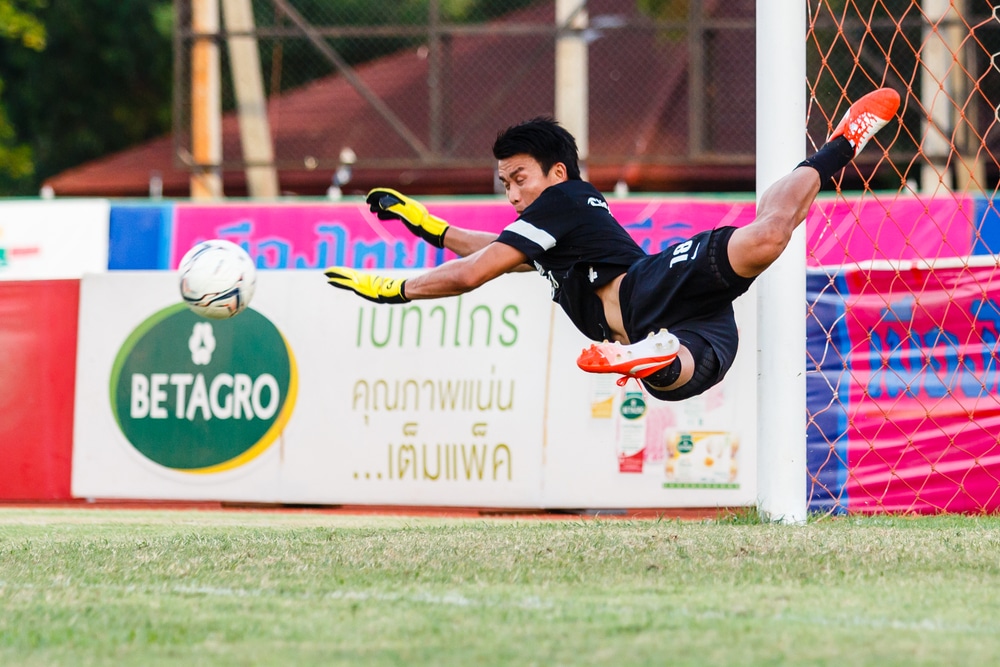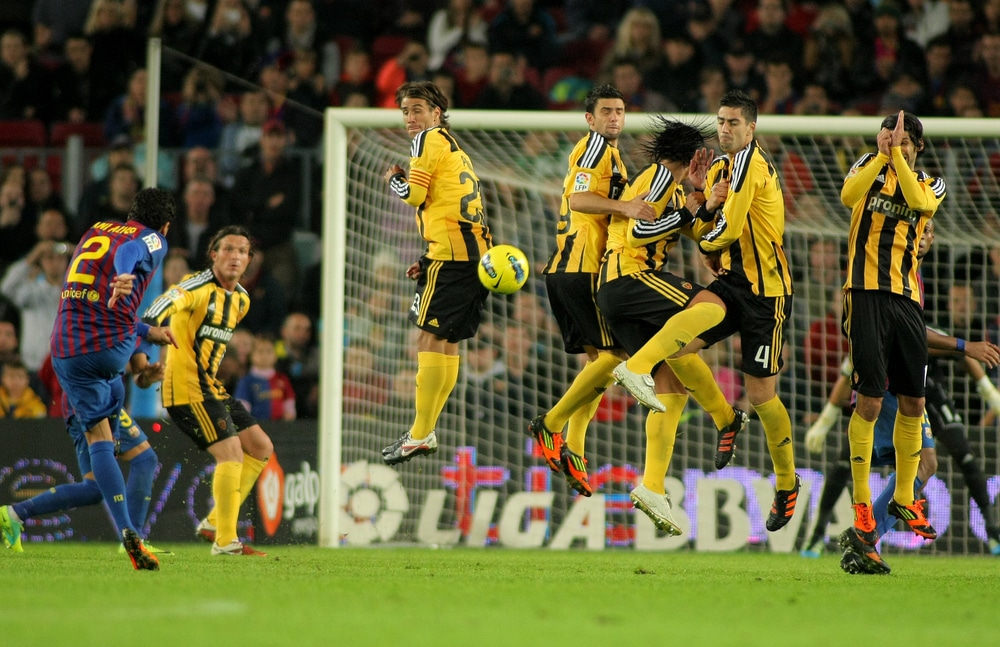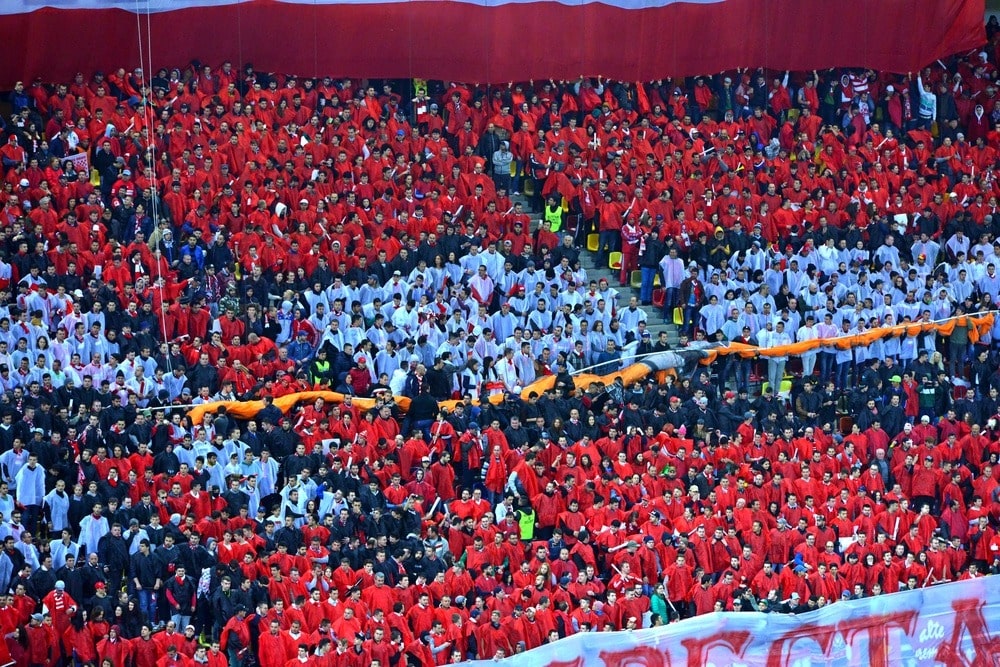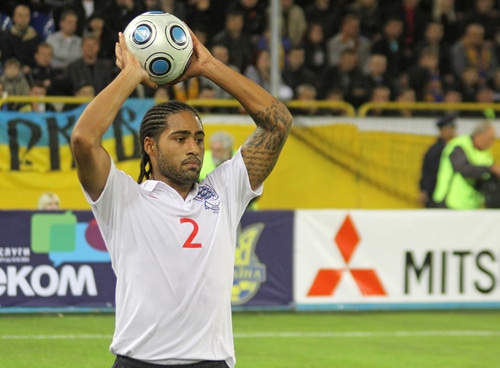Contents
- General Soccer Vocabulary
- Arbitre assistant — Assistant referee
- Attaquant — Forward; attacker
- L’avant-centre — Center-forward
- But égalisateur — Equalizer
- Banc de touche — Sideline bench
- Carton rouge — Red card
- Carton jaune — Yellow card
- Centrer le ballon — To center the ball
- Classico
- Corner — Corner kick
- Coup d’envoi — Kick-off
- Défenseur — Defender
- Dégager — To clear (the ball from the defensive zone)
- Faute — Foul
- Frappe de la tête / Une tête — To hit the ball with the head; a header
- Gagner / remporter un match — To win a game
- Gardien de but — Goalkeeper
- Gradins — Stands
- Hors-jeu — Offsides
- Ligne de touche — Sideline or touchline
- Marquer un but — To score a goal
- Match à l’extérieur — Away game
- Match — Football match, soccer game
- Match nul — Draw, tie
- Mi-temps — Half-time
- Occasion — A good opportunity
- Passer le ballon — To pass the ball
- Pénalty — A free kick
- Les prolongations — Overtime; extra-time
- Remplaçant — Replacement player; substitute
- Spectateur / trice — Spectator
- Tacler — To tackle
- Temps additionnel — Additional time; injury time
- Terrain de football — Pitch; field.
- Tirer — To try and score a goal; to shoot
- Tirs au but — Penalty shoot-out
- Touche — Throw-in
- Les vestiaires — Locker rooms; dressing rooms
- Bonus phrases for Advanced Learners
- And One More Thing...
Common French Soccer Vocabulary

Sports can be a great way to start a conversation with the locals and put your French language skills to the test. However, the sheer amount of vocabulary can make this a daunting task: Sports talk can be chock full of idioms, slang, and informal expressions and it doesn’t help that the announcers usually talk at the speed of sound.
This guide will help you learn the basic vocabulary of France’s most popular sport: soccer (or football to you British). We’ve also thrown in a few more advanced expressions at the end if you’re ready to take your knowledge to the next level. Learn these words, and you can be a part of the conversation.
Download: This blog post is available as a convenient and portable PDF that you can take anywhere. Click here to get a copy. (Download)
General Soccer Vocabulary
Arbitre assistant — Assistant referee
Sometimes, this person’s job is also referred to as a ‘linesman’ or juge de lignes in French.
Si l’arbitre assistant veut signaler une sortie de ballon ou hors-jeu, il lèvera son drapeau.
(If the assistant referee wants to signal the ball going out of play or an offside, he will raise his flag)
Attaquant — Forward; attacker
L’équipe d’Espagne est très connue pour ses attaquants agressifs.
(The Spanish national team is very well known for its aggressive forwards.)
L’avant-centre — Center-forward
Also known as a striker, because their principal role is to score goals.
Un avant-centre qui ne marque pas de buts, c’est comme un boulanger qui ne boulange plus!
(A striker who doesn’t score any goals is like a baker that doesn’t bake any bread!)
But égalisateur — Equalizer
A goal that ties the score.
Il a marqué, à la dernière minute, le but égalisateur vital contre le Réal Madrid.
(He scored the vital goal that tied up the match against Real Madrid in the last minute.)
Banc de touche — Sideline bench
Tous les joueurs sur le banc de touche étaient pris par l’émotion suite au but égalisateur.
(All of the players on the sideline bench were overtaken with emotion after the goal that tied the game.)
Carton rouge — Red card
Given for serious fouls.
Il s’est pris plusieurs cartons rouges et a été suspendu pour la saison.
(He got several red cards and was suspended for the season.)
Carton jaune — Yellow card
Yellow card given as a first warning.
Le joueur a été sanctionné d’un carton jaune pour un tacle raté.
(The player was sanctioned with a yellow card for his botched tackle.)
Centrer le ballon — To center the ball
L’ailier gauche a centré le ballon mais l’avant-centre a raté l’occasion !
(The right-winger centered the ball, but the striker missed the opportunity to score.)
Classico
Derby between Real Madrid and FC Barcelona/also used in France to describe any important match up.
Ce week-end, c’est le classico: Paris SG – Olympique de Marseille!
(This weekend is the classico: Paris SG – Olympique de Marseille!)
Corner — Corner kick
Also known as coup de pied de coin, though this is archaic.
Il a égalisé le match à la 36e minute lorsqu’il a redirigé de la tête un corner.
(He tied up the match at the 36th minute when he redirected a corner kick with a header.)
Coup d’envoi — Kick-off
Le coup d’envoi de la finale sera donné le dimanche 13 juillet à 21h.
(The kick-off for the final game will take place Sunday July 13th at 9pm.)
Défenseur — Defender
Les défenseurs ont perdu l’espoir après le cinquième but!
(The defenders lost all hope after the fifth goal!)
Dégager — To clear (the ball from the defensive zone)
Dégage, dégage! Mais dégage! Ils vont marquer là!
(Get it out of there, get it out of there! Come on clear it! They are going to score!)
Faute — Foul
Le joueur s’est pris un carton jaune pour une faute commise sur le défenseur.
(The player was given a yellow card for a foul on the defender.)
Frappe de la tête / Une tête — To hit the ball with the head; a header
Il prend la relève et marque le seul but de la rencontre d’une tête ébouriffante.
(He took up the slack and scored the only goal of the game with a breathtaking header.)
Gagner / remporter un match — To win a game
La France a remporté le troisième match de suite ce soir avec sa victoire contre l’Irlande.
(France won the third match in a row this evening with its victory over Ireland.)
Gardien de but — Goalkeeper
Le gardien de but lyonnais a encaissé plus de 50 buts cette saison!
(The Lyon goalkeeper has let pass more than 50 goals this season!)
Gradins — Stands
Les spectateurs hurlaient dans les gradins après le carton jaune donné par l’arbitre.
(The spectators were yelling in the stands after the yellow card given by the referee.)
Hors-jeu — Offsides
Son but n’a pas été validé par l’arbitre parce qu’il était en position de hors-jeu.
(His goal was not counted by the referee because he was offsides.)
Ligne de touche — Sideline or touchline
L’arbitre assistant se déplace au bord du terrain, le long de la ligne de touche.
(The assistant referee runs up and down the side of the field along the sideline.
Marquer un but — To score a goal
Ils ont marqué un but à la 89e minute pour égaliser le match.
(They scored a goal in the 89th minute to tie up the match.)
Match à l’extérieur — Away game
A home game is known as a match à domicile.
L’équipe n’a remporté aucun match à l’extérieur cette année!
(The team hasn’t won any away games this year!)
Match — Football match, soccer game
Je me demande qui va gagner le match ce soir!?
(I wonder who is going to win the match this evening!?)
Match nul — Draw, tie
Après un match nul sans but face à la Grèce, la France a gagné son match hier soir (2-0) face à l’Italie.
(After a goalless draw against Greece, France won its game yesterday (2-0) against Italy.)
Mi-temps — Half-time
Les deux équipes se sont dirigées vers les vestiaires à la mi-temps.
(The two teams headed towards the locker rooms at half-time.)
Occasion — A good opportunity
Quelle occasion à rater ! Il a failli marquer un but !
(What a great opportunity to miss! He almost scored a goal!)
Passer le ballon — To pass the ball
Le joueur a fait passer le ballon par dessus son adversaire !
(The player passer the ball clear over the head of his opponent!)
Pénalty — A free kick
Also called a coup de pied de réparation, though this is archaic.
L’attribution du pénalty par l’arbitre fait débat entre les commentateurs.
(The referee’s decision to gave a free kick was debated by the commentators.)
Les prolongations — Overtime; extra-time
Be careful, this is different from temps additionnel!
Comme le score était de 1-1 à la fin du temps réglementaire, ils ont joué les prolongations.
(As the score was 1-1 at the end of regulation time, they went into overtime.)
Remplaçant — Replacement player; substitute
Le remplaçant a pris la place de son coéquipier après sa blessure.
(The sub took the place of his teammate after his injury.)
Spectateur / trice — Spectator
Il n’y a pas beaucoup de spectateurs dans les gradins aujourd’hui.
(There are not many spectators in the stands today.)
Tacler — To tackle
Le défenseur a taclé son adversaire pour arrêter son progrès sur le terrain.
(The defender tackled his adversary in order to stop his advance down the field.)
Temps additionnel — Additional time; injury time
L’arbitre a accordé 6 minutes de temps additionnel au temps réglementaire suite à de nombreuses blessures pendant le match.
(The referee added 6 extra minutes of additional time to the regulation time after numerous injuries during the game.)
Terrain de football — Pitch; field.
Le match était annulé suite aux orages hier soir parce que le terrain était trop humide.
(The match was cancelled after the storms yesterday evening, because the field was too wet.)
Tirer — To try and score a goal; to shoot
Il a tiré un boulet de canon vers le gardien de but.
(He sent the ball screeching towards the goalkeeper like a cannon ball.)
Tirs au but — Penalty shoot-out
Étant à l’égalité à la fin du match, les deux équipes doivent passer par les tirs au but pour se départager.
(As the game is all tied up, the two teams must now proceed to a penalty shoot-out to decide the winner.)
Touche — Throw-in
Le joueur a été sanctionné d’un carton parce qu’il gênait son adversaire lorsqu’il effectuait une touche.
(The player received a card because he was obstructing his opponent as he took a throw-in.)
Les vestiaires — Locker rooms; dressing rooms
Les joueurs écoutaient leur entraîneur dans les vestiaires.
(The players were listening to their coach in the locker rooms.)
FluentU takes authentic videos—like music videos, movie trailers, news and inspiring talks—and turns them into personalized language learning lessons.
You can try FluentU for free for 2 weeks. Check out the website or download the iOS app or Android app.
P.S. Click here to take advantage of our current sale! (Expires at the end of this month.)
Bonus phrases for Advanced Learners
For more football-centric phrases, check out the list below:
Faire une Arconada: When a goalkeeper allows the ball to slip from his or her grasp and into the goal after a save. The expression comes from the name of a Spanish goalkeeper who made this mistake during the final game of the 1984 European Championships.
Ascenseur: Literally meaning “elevator,” this expression refers to when a player uses another player in order to hoist himself into the air in order to strike the ball, usually with his head.
Café Crème: A generic expression used to describe a skilled dribble that eliminates, often in a humiliating manner, the threat posed by an opponent.
Fermer la boutique: Expression used when a team adopts an ultra-defensive strategy after gaining the lead. In English, the expression “to park the bus” is often used to describe this strategy.
Fusiller le gardien: When a player scores a goal with an extremely powerful kick which leaves the goalkeeper with no chance of saving it.
Sortie kamikaze: When a goal keeper ventures out from the goal, leaving it unprotected, in order to confront an attacker.
Download: This blog post is available as a convenient and portable PDF that you can take anywhere. Click here to get a copy. (Download)
And One More Thing...
If you like learning French at your own pace and from the comfort of your device, I have to tell you about FluentU.
FluentU makes it easier (and way more fun) to learn French by making real content like movies and series accessible to learners. You can check out FluentU's curated video library, or bring our learning tools directly to Netflix or YouTube with the FluentU Chrome extension.
One of the features I find most helpful is the interactive captions—you can tap on any word to see its meaning, an image, pronunciation, and other examples from different contexts. It’s a great way to pick up French vocab without having to pause and look things up separately.
FluentU also helps reinforce what you’ve learned with personalized quizzes. You can swipe through extra examples and complete engaging exercises that adapt to your progress. You'll get extra practice with the words you find more challenging and even be reminded you when it’s time to review!
You can use FluentU on your computer, tablet, or phone with our app for Apple or Android devices. Click here to take advantage of our current sale! (Expires at the end of this month.)

